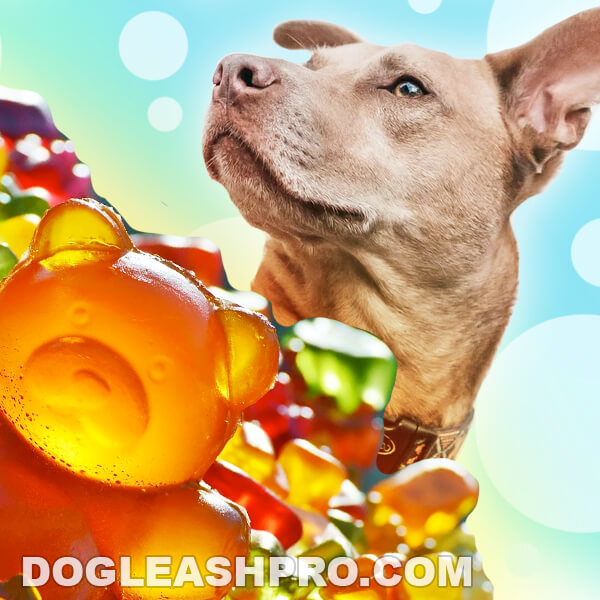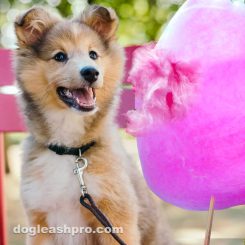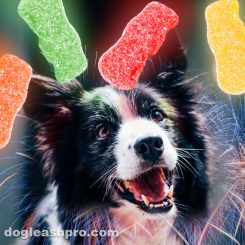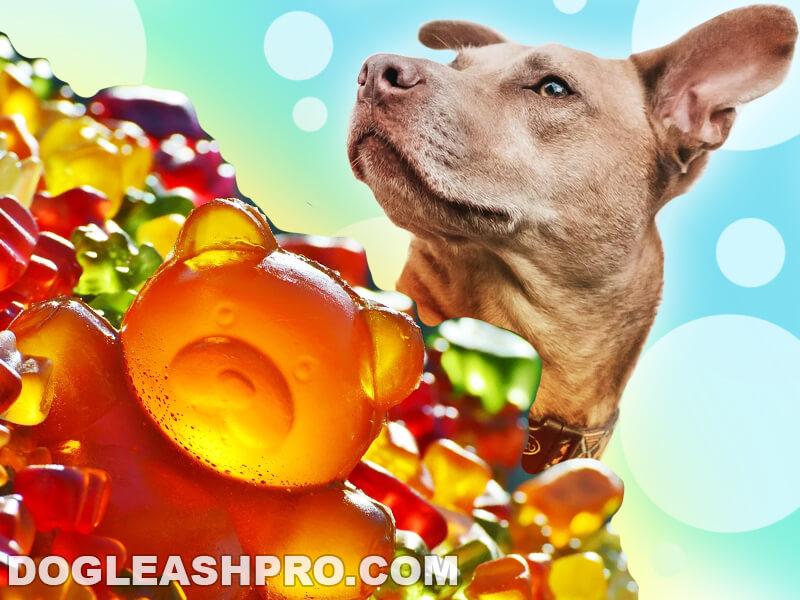
Can dogs eat Gummy Bears? No, dogs should not eat Gummy Bears. Gummy Bears are packed full of sugar and fats. Eating too many Gummy Bears can cause upset stomach, diabetes, obesity, and a whole host of other health issues in dogs. These chewy candies may also contain ingredients such as xylitol, which is extremely toxic to dogs.
Gummy Bears are sweet (sometimes sour), colorful, and fun to eat. But does that come at a cost? Gummy Bears look harmless so are they safe for doggy consumption? Here’s the short answer first before we discuss how Gummy Bears can affect your dog’s health.
Table of Contents
Can dogs have Gummy Bears?
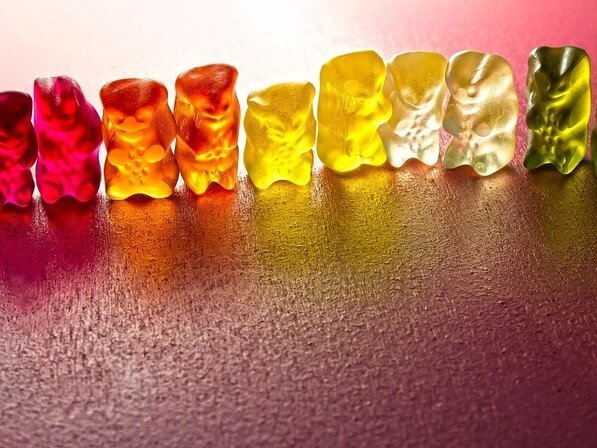
No, dogs should not have Gummy Bears. It’s not a good idea to feed our canine friends Gummy Bears since Gummy Bears are considered sweets or candy.
These chewy candies are packed full of sugar and contain fats. Both sugar and fats are harmful to our furry friend’s health.
Let’s dig deeper and take a look at the ingredients of some of the most popular Gummy Bears in the US.
Haribo Gummy Bears Ingredients
- Glucose syrup from wheat or corn.
- Sugar.
- Gelatin.
- Dextrose from wheat or corn.
Haribo Goldbears contains less than 2% of the following:
- Citric acid.
- Artificial and natural flavors.
- Palm oil.
- Palm kernel oil.
- Carnauba wax.
- White beeswax.
- Yellow beeswax.
- Yellow 5.
- Red 40.
- Blue 1.
Haribo Gummy Bears may contain wheat and traces of milk.
Albanese Gummy Bears Ingredients
- Corn Syrup from Corn.
- Sugar from Beets.
- Water.
- Gelatin.
- Citric Acid.
- Natural and artificial flavors.
- Pectin is derived from fruit.
- Vegetable Oil from coconut and canola (Coconut oil is highly refined and is not considered an allergen).
- Carnauba leaf wax to prevent sticking.
- FD&C Yellow #5.
- FD&C Red #40.
- FD&C Yellow #6.
- FD&C Blue #1.
- Yellow #5 – E102.
- Red #40 – E129.
- Yellow #6 – E110.
- Blue #1 – E133.
Albanese Sugar-Free Gummy Bears Ingredients
- Maltitol Syrup.
- Water.
- Gelatin.
- Lactic Acid.
- Natural and artificial flavors.
- Citric Acid.
- Pectin is derived from fruit.
- Vegetable Oil from coconut and canola (Coconut Oil is highly refined and is not considered an allergen).
- Carnauba Leaf Wax to prevent sticking.
- Aspartame.
- FD&C Yellow #5.
- FD&C Red #40.
- FD&C Yellow #6.
- FD&C Blue #1.
- Yellow #5 – E102.
- Red #40 – E129.
- Yellow #6 – E110.
- Blue #1 – E133.
Black Forest Gummy Bears Ingredients
- Corn syrup.
- Sugar.
- Gelatin.
- Modified food starch (corn).
- Citric acid.
- Apple juice from concentrate.
- Sodium citrate.
- Natural and artificial flavors.
- Coconut oil to adds a small amount of fat.
- Colors from black carrot juice, beta-carotene, spirulina extract, and turmeric.
- Carnauba wax.
Brach Gummy Bears Ingredients
- Corn Syrup.
- Sugar.
- Gelatin.
- Modified Food Starch from corn.
- Citric Acid.
- Apple Juice from Concentrate.
- Sodium Citrate.
- Natural and artificial flavors.
- Coconut Oil to add fats to the Gummy Bears.
- Carnauba wax to add fats to the Gummy Bears.
- Red 40.
- Yellow 5.
- Blue 1.
Too much sugar consumption from Gummy Bears can cause diabetes in dogs
What makes Gummy Bears fun to eat and interesting, besides their variety of different colors, is that they are very sweet. This is because Gummy Bears are packed full of sugar.
The sugar used in Gummy Bears come from a variety of sources such as:
- Corn syrup.
- Glucose syrup from wheat or corn.
- Sugar from beets.
- Maltitol syrup.
As we can see, no matter if we call it glucose syrup, corn syrup, maltitol syrup, or beets sugar, they are all considered sugar. Too much sugar consumption is extremely harmful to dogs.
You might also like: Can Dogs Eat Cotton Candy?
If your pooch consumes too much sugar, he or she will get an upset stomach. That’s because too much sugar intake can disrupt the balance of the microorganisms in their gut, which is crucial to breaking down food in their digestive system.
When there are more bad bacteria than good bacteria in the dogs’ gut, they may have explosive and bloody diarrhea or may vomit.
Another health issue caused by eating too much sugary food is having dental issues. Unfortunately, the bacteria in your dog’s mouth use the sugar to produce acids. The acid is pretty strong and will slowly destroy the enamel (outer coating of the teeth). What results is cavities and tooth decay.
Similar to humans, if our K9 friends consume sugar regularly, they are at risk of weight gain and obesity. It’s best to avoid feeding your dogs sugary food such as Gummy Bears because this type of food is considered “empty calories” food.
They provide no nutritional benefits while increasing your dog’s calories and weight.
When dogs start to gain weight, they may experience lethargy, joint pain, difficulty breathing, and heart disease. Your dog will soon become obese.
Not only that but also too much sugar consumption can also affect your dog’s metabolism and hormones. Your pup’s metabolism will change and he will start to become weak, store fat, and lose muscle tone.
Let’s not forget that too much sugar can also cause Type II diabetes in dogs and in worse cases, they may have pancreatitis.
For all these reasons, we highly recommend that owners avoid feeding their canine family members Gummy Bears.
Gelatin in Gummy Bears isn’t good for dogs
While gelatin, on its own, is relatively good for dogs, gelatin in Gummy Bears is not good for dogs. That’s because gelatin on its own contains approximately 99% pure protein.
However, when it’s mixed with tons of sugar, food coloring, artificial flavors, and fats, it is not healthy for dogs.
So although Gummy Bears contain gelatin, you’ll still want to keep this candy away from dogs.
READ ALSO: Can Dogs Eat Jello? Complete Guide to Dogs & Gelatin
Citric acid in Gummy Bears can be problematic for dogs in large quantities
The citric acid in Gummy Bears helps to bring out the sweet flavor and act as a preservative. While it helps the Gummy Bear to maintain longer shelf life, citric acid isn’t good for our furry pals.
If dogs consume large quantities of citric acid, they may experience central nervous system depression.
Luckily, most dogs naturally do not like the taste of food or fruits with citric acid and will steer clear of them on their own.
There are some dogs that like sour fruits and food. If your pooch likes sour food, then you’ll want to be extra careful and make sure they don’t get into your bag of Gummy Bears.
Fun Fact: Starburst also contains citric acid as one of its ingredients so are they safe for doggy consumption? Check out Can Dogs Eat Starburst? to find out!
Artificial flavors in Gummy Bears are harmful to dogs
Artificial flavors are bad for dogs. Gummy Bears uses artificial flavors to make the chewy candy taste, smell, and look fun and attractive.
In all of the popular Gummy Bears brands we’ve mentioned above, all of them use artificial colorings as well such as Yellow 5, Red 40, and Blue 1. These artificial colorings are what give the Gummy Bears their bright colors.
Let’s go over each of them.
Yellow 5 and Red 40: Many experts have warned that dyes such as Yellow 5 and Red 40 cause health issues like tumors, hyperactivity, and allergies. Red 40 initially comes from coal tar.
Blue 1 is another artificial coloring in Gummy Bears. Blue 1 is a synthetic that came from coal tar.
Since Gummy Bears contain these artificial colors or dyes, it’s best that owners avoid feeding their canine friends this chewy candy.
Besides, our canine friends can’t see colors as we do so it doesn’t matter how colorful or bright their food is.
At the end of the day, they simply need food that contains protein, essential vitamins, and minerals. If you like to give your pooch doggy treats, make sure the treats are dog-friendly first.
Carnauba wax in moderation is fine for dogs
There was a study done on Beagle dogs that shows carnauba wax in moderation is not toxic to dogs. In this study, Beagles were fed carnauba wax in their diet. After 28 weeks of consuming carnauba wax, these Beagle dogs did not show any sign of toxicity in their bodies.
It’s important to point out that the study was careful with how much carnauba wax they fed the Beagle dogs. They made sure it was only a tiny amount of 0.1%, 0.3%, and 1% of their daily diet.
When the study concluded, the Beagle dogs consuming carnauba wax for 28 weeks has similar body composition as dogs that did not consume this wax.
Are Gummy Bears bad for dogs?
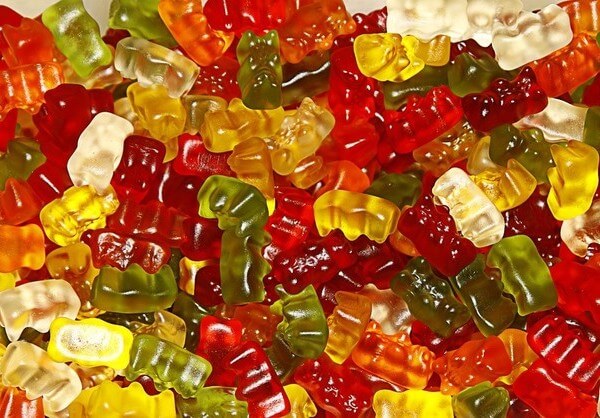
Yes, Gummy Bears are bad for dogs. Let’s take a look at the nutritional profile of one of the most popular Gummy Bears, the Haribo Goldbears, to see why.
Nutritional Profile of Haribo Gummy Bears (1 Piece or 3 Grams)
| Name, Unit | Amount |
| Calories, cal | 7.7 |
| Sugar, g | 1.1 |
| Sodium, mg | 0.4 |
| Total Carbohydrate, g | 1.8 |
| Total Fat, g | 0 |
| Protein, g | 0.2 |
As we can see, just one tiny Gummy Bear is packed full of sugar, calories, carbohydrates, and even salt.
Our canine friends do not need their owners to give them sugar. In fact, they naturally receive their sugar intake from complex carbohydrates found in their well-balanced and nutritious food.
When we purposely feed them sugar, whether from Gummy Bears or other candy, we are contributing to their sugar intake.
Too much sugar intake can cause a whole host of health issues which we’ve explained above.
Also, keep in mind that our dog’s daily diet already contains the salt amount that they need. If we feed them candy that also contains salt, we’re contributing to their salt intake as well. Too much salt consumption can cause sodium-ion poisoning in dogs.
Lastly, we can see that just one small Gummy Bear contains 7.7 calories and 1.8 grams of carbohydrates. This makes Gummy Bears an empty-calorie snack for dogs. They don’t provide any nutrients to our pooch and only cause dogs to gain weight.
So, is Gummy candy bad for dogs? Yes, Gummy candy is bad for dogs. Owners should avoid feeding their K9 friends Gummy candy.
Are Gummy Bears ok for dogs?
Gummy Bears are not ok for dogs to eat. The high amount of sugar, carbs, calories and even salt in just one Gummy Bears is very concerning. It’s best for owners to keep Gummy Bears away from their furry family members.
Are Gummy Bears good for dogs?
Gummy Bears are not good for dogs. Other than the 0.2 grams of protein in one Gummy Bear, this chewy, sweet, and fun candy does not provide any other nutrients that would be beneficial to dogs.
Also, our furry friends should receive their protein intake from their healthy and well-balanced daily diet and not from candies like Gummy Bears.
Moreover, there are plenty of dog-friendly treats that are healthier for our precious pooch than Gummy Bears.
Can dogs eat Haribo Gummy Bears?
No, dogs should not eat Haribo Gummy Bears. Are Haribo Gummy Bears bad for dogs? Yes, Haribo Gummy Bears are bad for dogs because they contain tons of sugar and fats which are extremely harmful to dogs.
There are also traces of wheat and milk in these Gummy Bears. If your furry friends have wheat or gluten allergy or are lactose intolerant, avoid feeding them Haribo Gummy Bears.
Additionally, there are artificial colorings, dyes, and flavors such as Yellow 5, Red 40, and Blue 1 which are harmful to dogs.
Simply taking a look at the ingredients of this popular Gummy Bears brand, it is safe to say that we should not be feeding our precious pooch Haribo Gummy Bears.
Do Haribo Gummy Bears have xylitol?
Thankfully, Haribo Gummy Bears do not have xylitol. While Gummy Bears without xylitol may appear to be safe for doggy consumption, Gummy Bears are still not healthy for dogs to eat.
There are tons of sugar in this popular Gummy Bear brand and consuming too much sugar is harmful to dogs such that it can cause dogs to have diabetes, weight gain, dental issues, metabolism changes, and even pancreatitis.
So, do Haribo Gummy Bears contain xylitol? Fortunately, the answer is no, it does not.
Can dogs eat Black Forest Gummy Bears?
No, dogs should not eat Black Forest Gummy Bears. Black Forest Gummy Bears are also packed full of sugar and contain citric acid as well as artificial flavors.
We do have to point out that what makes Black Forest Gummy Bears different from other popular Gummy Bears brands is that the color of the Gummies is not from artificial coloring or dyes.
Instead, the colors of the Gummy Bears come from more natural sources such as turmeric, spirulina extract, beta-carotene, and black carrot juice.
However, this still does not make Black Forest Gummy Bears safe for doggy consumption. It’s best to keep Gummy Bears away from dogs.
Do Black Forest Gummies have xylitol?
No, Black Forest Gummies do not contain xylitol. This brand uses sugar, corn syrup, apple juice from concentrate, and artificial and natural flavors to make the Gummy Bears very sweet.
Do Albanese Gummy Bears contain xylitol?
No, Albanese Gummy Bears do not contain xylitol. We took a look at the regular Albanese Gummy Bears and the Albanese Sugar-Free Gummy Bears and they both do not contain xylitol.
Instead of xylitol, the Albanese Gummy Bears use a sugar substitute called maltitol syrup. Maltitol syrup is a hydrogenated glucose syrup with hydrogenated oligo- and polysaccharides and sorbitol content.
Produced from corn starch and other starch sources such as tapioca, wheat, or potato, maltitol syrup is not toxic to dogs. However, this does not mean that dogs can safely have Albanese Sugar Free Gummy Bears just because it doesn’t contain xylitol.
Albanese Sugar-Free Gummy Bears are just as bad as the regular Albanese Gummy Bears and dogs should stay away from both.
Can dogs eat Gummy Bears without xylitol?
While Gummy Bears without xylitol is not poisonous to dogs, we still highly recommend that you do not feed your dogs Gummy Bears. As we can see, Gummy Bears are still harmful to dogs regardless of whether they contain xylitol.
The amount of sugar, fats, and calories in Gummy Bears are not safe for doggy consumption and can negatively affect your dog’s health.
Allowing your dog to eat Gummy Bears regularly without xylitol can still cause weight gain, diabetes, cavities, tooth decay, obesity, and even pancreatitis.
Can dogs die from eating Gummy Bears?
Dogs can potentially die from eating Gummy Bears if the Gummy Bears contain a sugar-free sweetener called xylitol. Xylitol is extremely poisonous to dogs. Dogs that consume Gummy Bears with this sugar-free sweetener are at risk of xylitol poisoning.
That’s because when our precious pooch consumes food or candy that contains xylitol, the xylitol gets absorbed into their bloodstream rather quickly. The insulin then gets released very quickly from the pancreas and this quick release of insulin is what causes a huge drop in blood sugar levels.
What results is your dog experiencing hypoglycemia. This can happen very fast such that your pooch may have a drop in blood sugar as quickly as 10 minutes after consumption.
Dogs with hypoglycemia require immediate medical attention since this condition is life-threatening and can cause both liver failure and kidney failure in dogs.
Thus, it’s best to always take a look at the ingredients of the Gummy Bears first before offering them to your pooch. If the ingredient lists xylitol, do not feed the Gummy Bears to your pooch.
Do Gummy Bears contain xylitol?
Fortunately, the popular Gummy Bears we’ve listed above do not contain xylitol. However, be extra careful of sugar-free Gummy Bears since those may contain xylitol.
We took a look at the Albanese Sugar-Free Gummy Bears and luckily it does not contain xylitol. Instead, it contains maltitol syrup. Maltitol syrup is not toxic to dogs.
However, there have been studies that show some dogs experiencing diarrhea and gastrointestinal upset after ingesting food with maltitol.
For this reason, it’s best for dogs to stay away from Gummy Bears, whether or not they contain xylitol.
Can puppies eat Gummy Bears?
No, puppies should not eat Gummy Bears since they are still young are still growing. Puppies are much more sensitive to sugar consumption and due to their smaller size, they may be easily affected.
So, can dogs eat Gummy Bears?
If you or your family members are enjoying some Gummy Bears, try not to share this sweet chewy candy with your canine friends. Not only are Gummy Bears harmful to your pooch, but regularly eating this candy can cause a whole host of health issues in dogs.
Be sure to check the ingredients of human snacks before you share them with your precious pooch. If you’re not sure, we highly recommend that you consult your vet to ask for their professional advice and suggestion.
DISCLAIMER: THIS WEBSITE DOES NOT PROVIDE MEDICAL ADVICE
The information, including but not limited to, text, graphics, images and other material contained on this website are for informational purposes only. No material on this site is intended to be a substitute for professional veterinary advice, diagnosis, or treatment. Always seek the advice of your veterinarian or other qualified health care provider with any questions you may have regarding dietary needs.
Resources:
https://en.wikipedia.org/wiki/Gummy_bear
https://pubmed.ncbi.nlm.nih.gov/20473849/

With over five years of specialized experience as an animal writer, my expertise lies in dog nutrition, health, behavior, grooming, and training. I am dedicated to delivering helpful and informative content that caters to the well-being of our furry friends. My primary goal is to empower pet owners with knowledge and ensure our canine companions thrive in health and happiness. In my free time, I love volunteering at local dog rescue centers.
